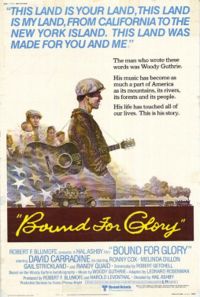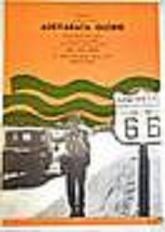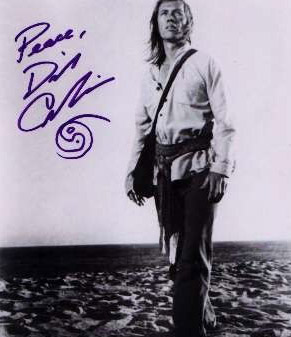 | Bound for Glory: the Woody Guthrie film1977 |
|
|
|
David Carradine |
"Of all the five best picture nominees of 1976, "Bound for Glory" is the most difficult for most to remember. I mean it was the quiet film in a year which consisted of "Rocky", "Network", "All the President''s Men" and "Taxi Driver". Woody Guthrie (David Carradine of "Kung Fu" fame) is suffering through the Dust Bowl of Pampa, Texas in 1936. There are no jobs, no crops and really no hope. Guthrie decides that the best way for him to do his part is to become a folk singer for the poorest peoples of Northern Texas and depression-era Oklahoma. What follows is a genuinely wonderful story which is all based upon the life of America''s greatest folk singer. "Bound for Glory" is well-written, well-directed by the wonderful Hal Ashby and well-acted by David Carradine in the role of a lifetime. Melinda Dillon, Randy Quaid and Ronny Cox are among the other players, but this is Carradine''s show from the word go. A wonderful, but truthfully somewhat forgotten masterpiece from the 1970s. 4.5 out of 5 stars."
Long before it was ?cool? to be controversial, long before it was ?cool? to sing protest songs, Woodrow Wilson ?Woody? Guthrie struck out for glory. Where I didn?t find the interpretation in the movie Oh, Brother, Where Art Thou? to be chic, I was struck with the same genre, the depression era songster, in Bound for Glory quite differently.
This 1976 release is an autobiography of singer Woody Guthrie, a man that seldom settled in one spot for long and always had his eye on the far horizon. David Carradine plays the lead part, his wife, Mary, is played by Melinda Dillon. Also in the cast are Ronny Cox as Ozark Bule and Randy Quaid as Luther Johnson.
Guthrie, as depicted in the story, was a musicians? musician. He believed in the purity of his work and defied those that wished him to compromise his own values to become more commercialized. For the most part, he traveled by rail, often leaving his family for months on end, for little fame and little glory.
As in his life and the movie, he became deeply involved in the rights of itinerant workers, often getting beaten and thrown out of town because he demanded that their worth be recognized by the companies that ruled them.
It was always his intent to bring music to those he met along the way. A long celebrated radio gig worked his last nerve when the sponsors demanded he drop his political views on the airways or leave. He left. Following this, he is offered a shot at the Coconut Grove, again he must bow to the wishes of others. He refused.
Perhaps the sad thing is really that he was born long before his time. Born in 1912, few were ready for the outspoken man that took his beliefs to the public. Ten years, even 15 years later, most would champion his right to demand his views and music remain pristine to his wishes.
As a biopic, this was richly superior in cinematography and musical score. The singular flaw I found with the entire movie was with the man himself, not the production. And, frankly, not so much a flaw in that those that are ruled by their inner beings sometimes walk to different tunes in life.
Although he often abandoned his family physically, he financially supported them, so again, a minor flaw. Perhaps a person that should have never taken on the roots of a wife (wives) and children, he was a wanderlust throughout his life.
Carradine gave an outstanding performance as Woody Guthrie. In fact, the main reason I stayed with this movie was his performance and I have really blanked out the other stars that were in the movie. Shame on me. Smoothly directed by Hal Ashby with sometimes startlingly and often evocative camera work by Haskell Wexler, this wonderful movie deserves each award it received:
WON Oscar? - Best Cinematography (Wexler), Best Music, Original Song Score, etc (Rosenman); LAFCA Award ? Best Cinematography (Wexler); NBR Award ? Best Actor (Carradine); NSFC Award ? Best Cinematography (Wexler).
NOMINATED Oscar? - Best Costume Design (Theiss); Best Film Editing (Herring, Jones); Best Picture (Blumofe, Leventhal); Best Writing (Getchell); Golden Palm, Cannes (Ashby); Golden Globe ? Best Acting Debut Female (Dillon), Best Director (Ashby), Best Motion Picture, Best Actor Drama (Carradine); WGA Screen Award ? Best Drama Adapted from Another Medium (Getchell).
Woody Guthrie died in 1967 from Huntington?s Chorea. Eventually appreciated and often imitated, he didn''t live to see his rewards take fruit, but his songs live on ??.
"Well, it''s always we ramble that river and I
All along your green valley, I''ll work till I die
My land I''ll defend with my life, if it be
''Cause my pastures of plenty must always be free"
Pastures of Plenty[1]
Woody Guthrie was inducted into the Songwriters Hall of Fame( 1971), Nashville Songwriters Hall of Fame (1977), Rock and Roll Hall of Fame (1988), A Grammy (1999) and Folk Alliance Lifetime Achievement Award (1996). Perhaps a song you will be more familiar with by this artist is This Land Is Your Land, a song he felt was the heart of America.
to read more about this musician, please visit: http://www.woodyguthrie.org/biography.htm
[1] Lyrics by Woody Guthrie
Thanks,
Susi
This contribution is for the movie write-off hosted by lynus. If you go to his profile page he was nice enough to set up links to each participant, good lynus (http://www.epinions.com/user-lynus).
If ya don?t wanna, they are:
Lynus, kristinafh, xxxxer, pmills1210, petra, deaser26, shadow8, xiphoid, tigger500, artbyjude, bluehawg, dashblast, granniemose, snakeayez, alex_isit, jankp, and oh yeah, me.
This is no April Fool?s joke, but it sure is stealth!
Note all stars in this production were a Kevin Bacon #2, which really ticked me off! - http://www.epinions.com/content_59745996420
КЭРРЕДИН, Каррадин (Carradine) Дэвид (р. 08. 12. 1936), американский актер, режиссер, певец, автор песен. Принадлежит к известной актерской династии — сын Джона Кэрредина, сводной брат Кита и Роберта Кэррединов, дядя Марты Плимптон. В 1969-1975 был связан бурными личными отношениями с Барбарой Херши, которая снималась вместе с ним в фильмах «Рай с оружием» (Heaven With A Gun, 1969), «Берта по прозвищу Товарный вагон» (Boxcar Bertha, 1972) и в поставленных самим Кэрредином лентах «Ты и я» (You And Me, 1972, выпуск — 1975) и «Американа» (Americana, 1973-1981, выпуск — 1983). Снимается в кино с 1964, нередко в приключенческих картинах разного типа, в том числе с применением восточных единоборств, поскольку сам увлекался этим в юности (одновременно и психоделическими наркотиками). Первого успеха достиг именно благодаря телесериалу «Кун-фу» (Kung Fu, 1972-1974), в 1986 был выпущен «Кун-фу, фильм» (Kung Fu, the Movie). Среди множества второстепенных и даже откровенно беспомощных лент с участием Кэрредина все-таки встречаются серьезные работы прославленных режиссеров: «На пути к славе» (Bound For Glory, 1976) Х. Эшби, «Змеиное яйцо» (Serpent''s Egg / Das Schlangenei, 1977, ФРГ—США) И. Бергмана, кроме того, такие фильмы, как «Долгое прощание» (The Long Goodbye, 1973) Р. Олтмена, «На границе» (On the Line, 1984, Испания—США) Х. Л. Борау, «Птичка на проводах» (Bird On A Wire, 1990) Дж. Бэдэма. В 1980 сыграл вместе со своими братьями в вестерне «Давно в седле» (The Long Riders) У. Хилла.
http://mega.km.ru/cinema/Encyclop.asp?Topic=CINEMA_ZP_807


